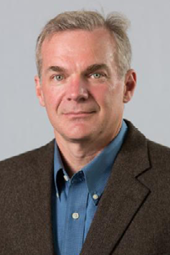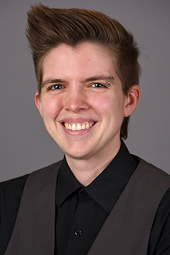The Multidisciplinary Postdoctoral Training Program in Basic Diabetes Research Program is led by Ormond MacDougald, PhD, Principal Investigator, and Peter Arvan, MD, PhD, who are supported by a diverse group of mentors who come from a variety of schools, departments, and divisions at Michigan Medicine.
Program Leadership
Ormond MacDougald, PhD

Ormond MacDougald, PhD, John A. Faulkner Collegiate Professor of Physiology, is a Professor of Molecular and Integrative Physiology and Professor of Internal Medicine. Dr. MacDougald received his undergraduate degree from the University of Guelph in Ontario, Canada, and his master’s degree and a doctorate from the Department of Physiology at Michigan State University. Dr. MacDougald pursued postdoctoral training from in the Department of Biological Chemistry at Johns Hopkins University, where he began his studies on adipocyte biology with M. Daniel Lane, PhD.
Dr. MacDougald is an internationally recognized investigator for his work on metabolism and adipocyte (fat cell) differentiation - the process by which a less specialized cell becomes a more specialized cell type.
Peter Arvan, MD, PhD

Peter Arvan, MD, PhD, William K. and Delores S. Brehm Professor of Diabetes Research, is a Professor of Internal Medicine, and Molecular and Integrative Physiology. Dr. Arvan received his bachelor's degree from Cornell University and his medical and PhD degrees from Yale University. Following residency training in internal medicine, Dr. Arvan completed fellowship training in endocrinology at Yale. Dr. Arvan then joined the faculty at Harvard Medical School in 1988. He moved to the Albert Einstein College of Medicine in New York in 1996 and became Division Chief at the Michigan Medicine in 2003.
Dr. Arvan's research work has focused on hormone synthesis, especially in two areas: thyroid hormone synthesis and insulin synthesis. He is specifically interested in understanding how the proteins that are hormone precursors are made and converted into medically-active hormones, and how these steps go wrong in various endocrine diseases.
Mentors
Our program currently includes 42 mentors in a highly collaborative environment, all with stable extramural funding. They are diverse in their area of specialty, with appointments in the School of Kinesiology, the College of Literature, Science, and the Arts, and many departments and divisions within the School of Medicine. The successful candidate will have the opportunity to match with a mentor based on the candidate’s research interests and experiences.
Learn About Our Mentors
- Alison Affinati, MD, PhD
- Farsad Afshinnia, MD
- David Antonetti, PhD
- Peter Arvan, MD, PhD
- Charles Burant, MD, PhD
- Eric Buras, MD, PhD
- Christian Burgess, PhD
- Gregory Cartee, PhD
- Maria Coronel, PhD
- Roger Cone, PhD
- Monica Dus, PhD
- Eva Feldman, MD, PhD
- Carrie Ferrario, PhD
- Patricia Fort, PhD
- Carol Elias, PhD
- Katherine Gallagher, MD
- Erin Giles, PhD
- Paula Goforth, PhD
- Jeffery Horowitz, MD
- Ken Inoki, MD, PhD
- Catherine Kaczorowski
- Robert Kennedy, PhD
- Matthias Kretzler, MD
- Jiandie Lin, PhD
- David Lorberbaum, PhD
- Carey Lumeng, MD, PhD
- Ormond MacDougald, PhD
- Anna Mathew, MD
- Martin Myers, Jr, MD, PhD
- David Olson, MD
- Elif Oral, MD
- Stephen Parker, PhD
- Subramaniam Pennathur, MD
- Rachel Reinert, MD
- Liangyou Rui, PhD
- Leslie Satin, PhD
- Randy Seeley, PhD
- Lonnie Shea, PhD
- Kanakadurga VNL Singer, MD
- Scott Soleimanpour, MD
- Jun Wu, PhD
- Lei Yin, PhD
Trainees
Since the program's inception in 2014, 14 trainees have completed the program. Of those 14:
- 11 have been retained at U-M
- 100% have stayed in research intensive fields
- 12 have stayed in academic institutions
2023-2024 Trainees

PhD


PhD


PhD
Past Trainees
2022-2023
Naima Dahir, PhD
Adelaide Tovar, PhD
Jordan Wean, PhD
2021-2022
Naima Dahir, PhD
Julie Finnell, PhD
Adelaide Tovar, PhD
Jordan Wean, PhD
Irina Zhang, PhD
2020-2021
Chenchen He, PhD
Julie Finnell, PhD
Allison Kowalsky, PhD
Phillip Webster, PhD
Irina Zhang, PhD
2019-2020
Diana Elizondo, PhD
Latrice Faulkner, PhD
Chenchen He, PhD
Allison Kowalsky, PhD
Phillip Webster, PhD
2018-2019
Latrice Faulkner, PhD
Diana Elizondo, PhD
Sarah Elzinga, PhD
Rebecca Schill, PhD
2017-2018
Jessica Adams, PhD
Sarah Elzinga, PhD
Chelsea Hutch, PhD
Bailey Peck, PhD
2016-2017
Jessica Adams, PhD
Callie Corsa, PhD
Lisa Guth, PhD
Yasuhiro Kyono, PhD
2015-2016
Tammy Barnes, PhD
Callie Corsa, PhD
Lisa Guth, PhD
Amy Rumora, PhD
2014-2015
Tammy Barnes, PhD
Mark Jimenz Canet, PhD
Lindsey Muir, PhD
Amy Rumora, PhD



